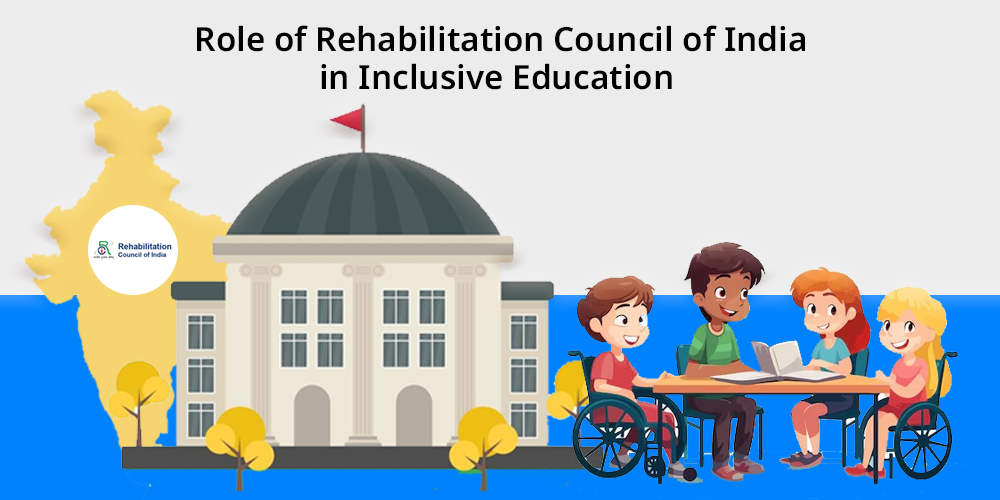
Do you know how the Rehabilitation Council of India (RCI) promotes inclusive education?
The Rehabilitation Council of India (RCI) promotes inclusive education through regulating and standardising the process of teaching and learning methods . This includes providing training programs to teachers or professionals to work with students who have disabilities.
RCI ensures the quality and uniformity of special education and rehabilitation services across the country by establishing minimum standards and recognising training institutions.
The main aim of RCI is to promote equality and diversity as inclusive education focuses on removing the barriers that hinder students from achieving quality education.
RCI makes sure that every student receives quality education irrespective of any challenges through providing proper support and services to students and working professionals.
However, RCI isn’t confined to a policy; instead, it ensures socio-economic empowerment of the physically needy students.
Table of Contents
- What is the Rehabilitation Council of India (RCI)?
- Top 9 Roles of the Rehabilitation Council of India in Promoting Inclusive Education
- 1. Standardising Training Programs
- 2. Maintaining the Central Rehabilitation Register
- 3. Promoting Research in Special Education
- 4. Accreditation of Teacher Training
- 5. Curriculum Development
- 6. Training and Capacity Building
- 7. Research and Development
- 8. Collaboration with Educational Institutes
- 9. Monitoring and Compliance
- Legal Framework for RCI in Inclusive Education
- Conclusion
What is the Rehabilitation Council of India (RCI)?
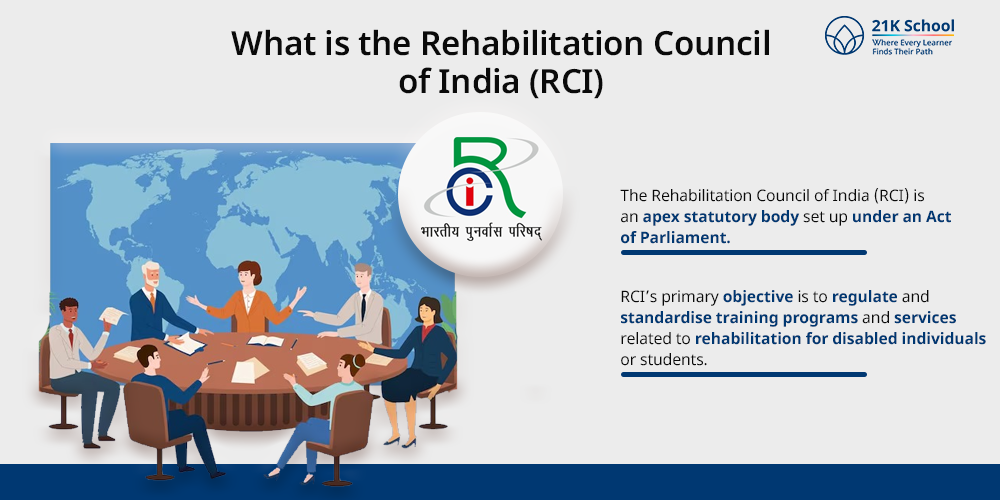
The Rehabilitation Council of India (RCI) is an apex statutory body set up under an Act of Parliament. It was established as a registered society in the year 1986 later on it became a statutory body under the RTI Act in 1992.
RCI’s primary objective is to regulate and standardise training programs and services related to rehabilitation for disabled individuals or students. RCI makes education equitable and more effective for people who have disabilities or need personal assistance.
It is the council’s responsibility to ensure the quality of education and training programs for professionals in the rehabilitation field and to encourage the adoption of uniform standards across the country.
The RCI plays a key role in promoting inclusive education in India by providing a variety of services and support to both educational institutions and people with disabilities.
Top 9 Roles of the Rehabilitation Council of India in Promoting Inclusive Education
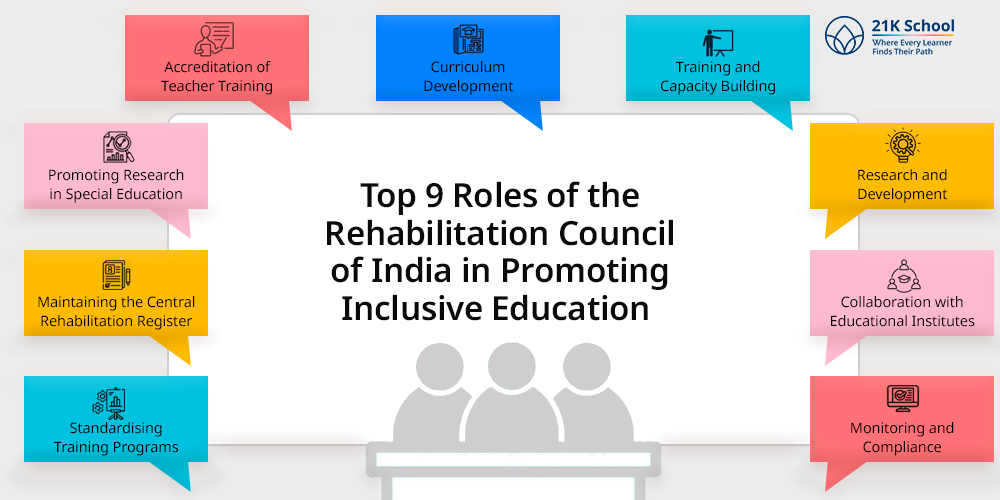
The Rehabilitation Council of India (RCI) plays an important role in promoting inclusive education through promoting various services and educational standards. RCI is a statutory body that regulates and standardises the training institutes.
RCI provides quality and uniformity in special education that meets the demands of every student, irrespective of any barriers. The following are the roles played by RCI in order to promote inclusive education.
1. Standardising Training Programs
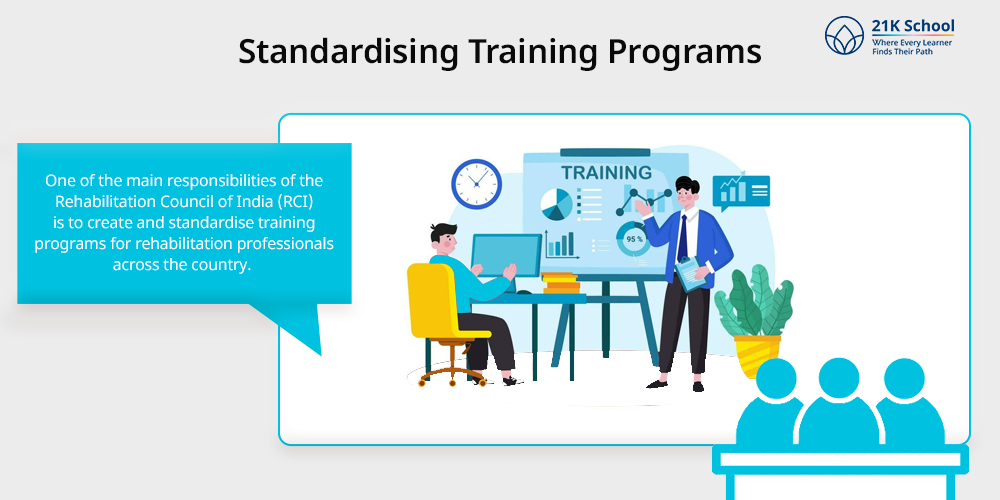
One of the main responsibilities of the Rehabilitation Council of India (RCI) is to create and standardise training programs for rehabilitation professionals across the country.
This involves creating a framework that enumerates the core skills, knowledge and competencies required for various special education and rehabilitation roles.
By standardising these programs, the RCI ensures that all professionals, regardless of where they work, receive a consistent level of training. This helps in promoting an inclusive classroom across various schools and educational institutions.
2. Maintaining the Central Rehabilitation Register
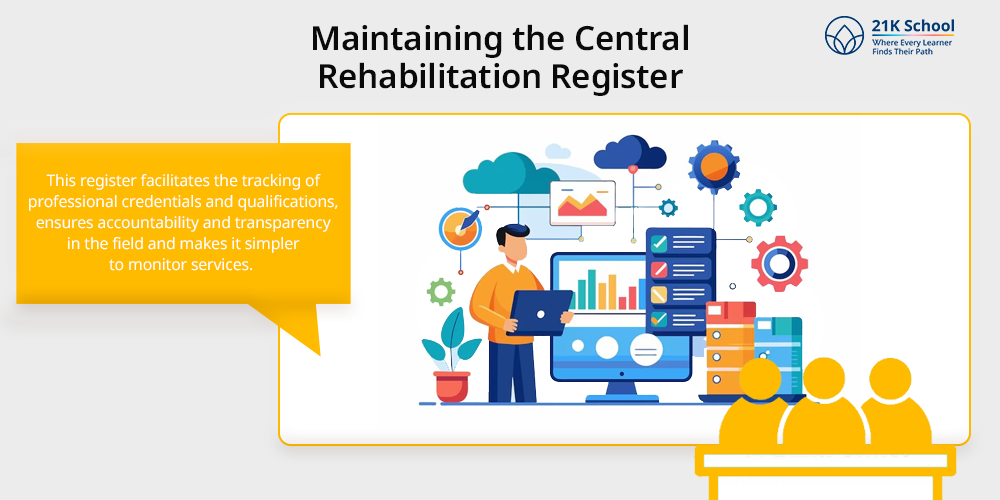
The Rehabilitation Council of India (RCI) is also responsible for maintaining the Central Rehabilitation Register (CRR), a vast database that includes detailed information about all registered rehabilitation professionals and institutions in India.
This register facilitates the tracking of professional credentials and qualifications, ensures accountability and transparency in the field and makes it simpler to monitor services.
The RCI makes sure that the rehabilitation services and assistance are provided by only qualified individuals to people with disabilities.
3. Promoting Research in Special Education
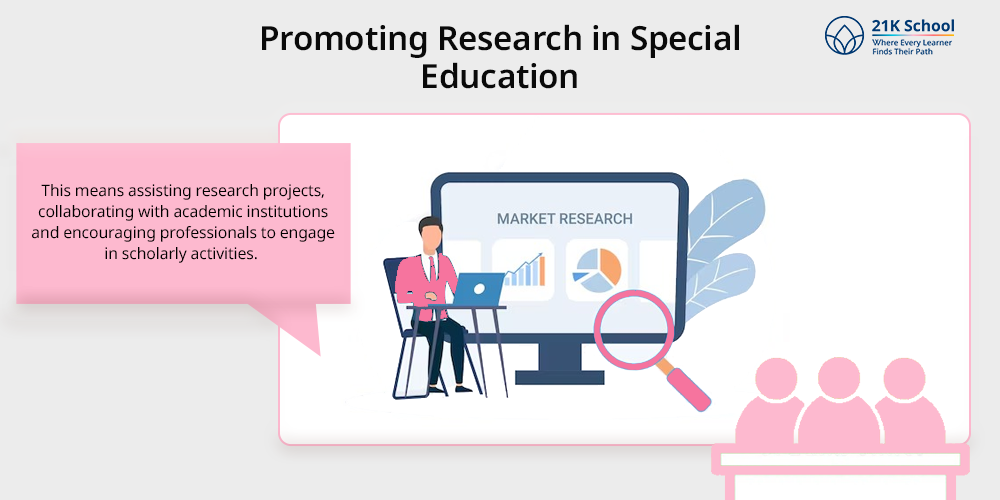
Another major role of the Rehabilitation Council of India (RCI) is that it actively supports and promotes research projects in the field of special education. This means assisting research projects, collaborating with academic institutions and encouraging professionals to engage in scholarly activities.
RCI takes charge of research and activities in order to enhance the quality of education and provide related services to students with disabilities. The research includes finding best knowledge and developing new approaches to promote inclusive learning.
4. Accreditation of Teacher Training
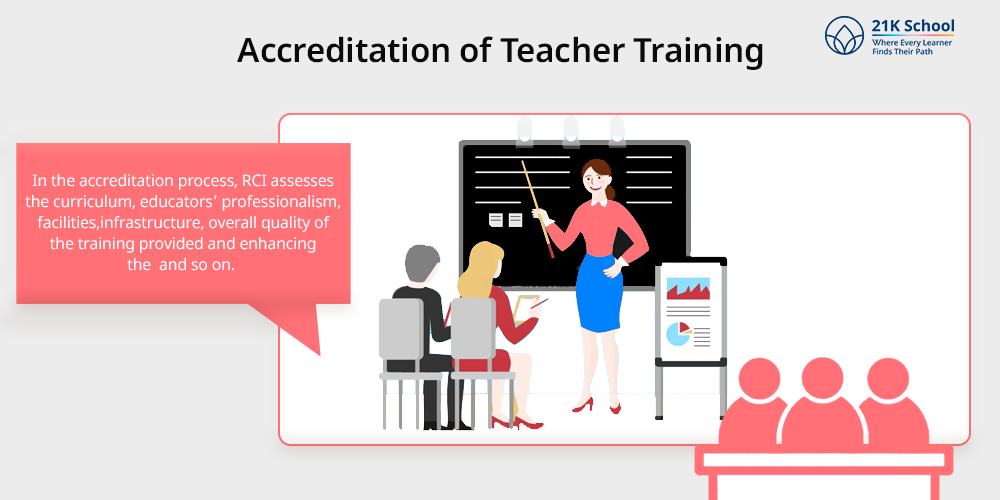
One of RCI’s important roles is to evaluate and accredit organisations that offer teacher training programs for individuals who work with persons who have disabilities.
In the accreditation process, RCI assesses the curriculum, educators’ professionalism, facilities, infrastructure, overall quality of the training provided and enhancing the and so on.
RCI ensures that accreditation is granted to only the best programs and helps teachers develop the necessary skills who are capable of meeting the diverse needs of their students.
5. Curriculum Development
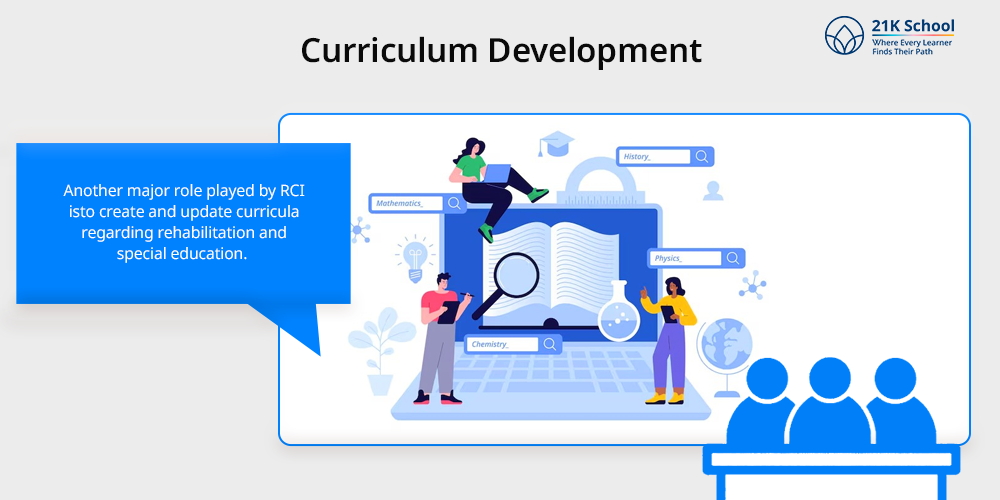
Another major role played by RCI is to create and update curricula regarding rehabilitation and special education. RCI plays an essential role in ensuring the educational resources reflect the latest advancements, research, findings and industry-relevant knowledge.
RCI also collaborates with industry experts, educators and specialists to develop inclusive, relevant and effective curriculum that addresses the needs of individuals with disabilities.
6. Training and Capacity Building
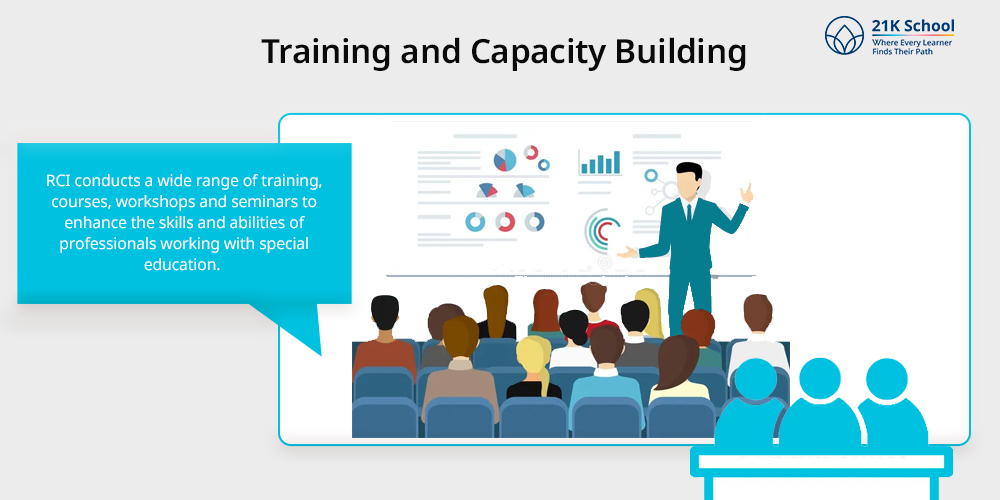
RCI conducts a wide range of training, courses, workshops and seminars to enhance the skills and abilities of professionals working with special education.
The goal of RCI is to meet the specific needs of special individuals by promoting inclusive teaching strategies, assistive technology and innovative approaches.
By providing funding for professional development, the RCI ensures that practitioners are better equipped and stay current with the latest advancements in the field.
7. Research and Development
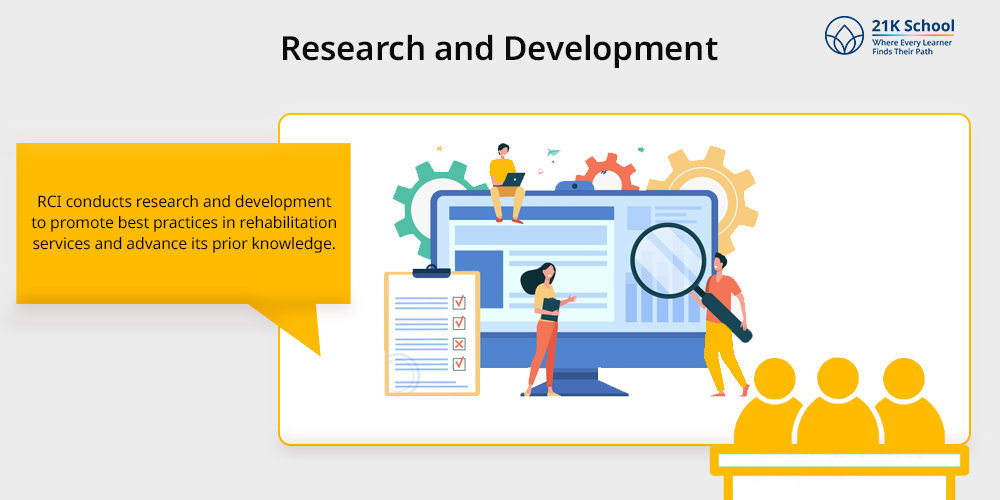
RCI conducts research and development to promote best practices in rehabilitation services and advance its prior knowledge. RCI includes evaluation of ongoing projects and the exploration of innovative services.
By prioritising research and development, RCI hopes to create a body of knowledge that will inform policy decisions, improve service quality and boost the overall effectiveness of rehabilitation programs.
8. Collaboration with Educational Institutes
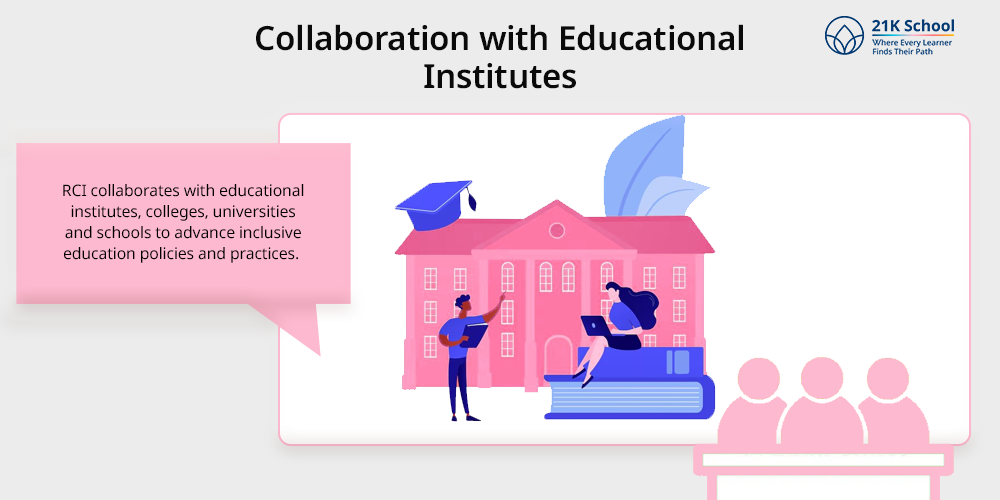
RCI collaborates with educational institutes, colleges, universities and schools to advance inclusive education policies and practices.
In order to create a positive learning environment that meets the requirements of all students, including those with disabilities, promote a collaborative learning environment. This also focuses on peer-to-peer learning and sharing of resources.
The RCI and educational institutions can work together to develop initiatives and programs that support inclusivity, raise public awareness, and ensure that all students have access to equal and transparent education.
9. Monitoring and Compliance
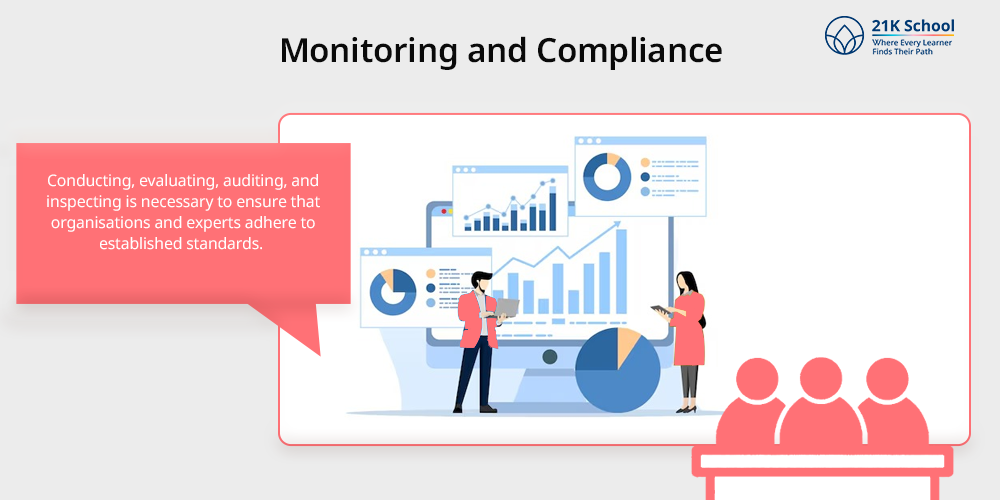
Another major role of RCI is to monitor the regulations and guidelines in rehabilitation services. Conducting, evaluating, auditing, and inspecting is necessary to ensure that organisations and experts adhere to established standards.
The RCI monitors compliance in an effort to maintain the effectiveness and standard of services provided to individuals with disabilities.
Legal Framework for RCI in Inclusive Education
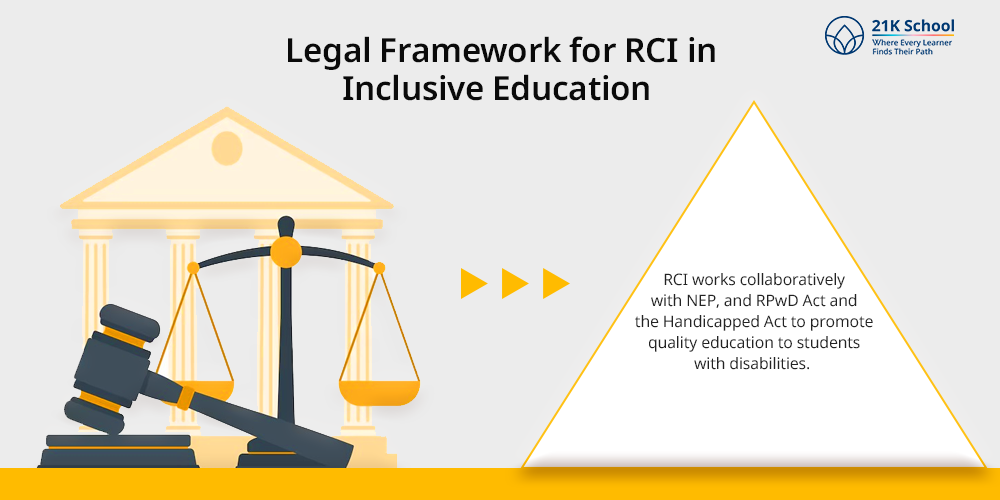
While the Rehabilitation Council of India (RCI) is a statutory government body, it has to comply with a legal framework. RCI works collaboratively with NEP, and RPwD Act and the Handicapped Act to promote quality education to students with disabilities.
RCI makes sure that every student receives the same education irrespective of any challenges. Below is the following legal framework compiled with RCI.
1. Rights of Persons with Disabilities Act 2016
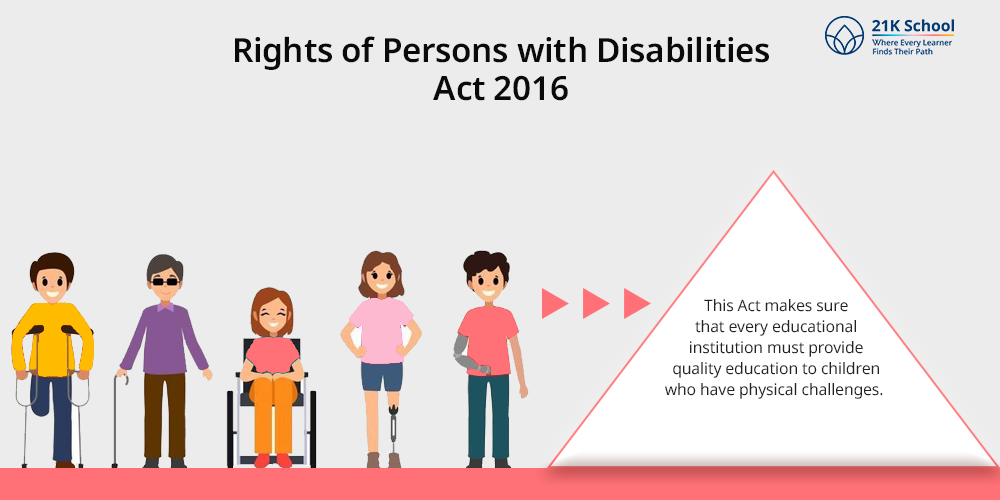
The Rights of Persons with Disabilities Act, 2016 (RPwD) is an act that denotes compulsory education for students with physical challenges. This Act was introduced in 2016 by the statutory body of the government.
This Act makes sure that every educational institution must provide quality education to children who have physical challenges.
The Rehabilitation Council of India (RCI) plays an important role in implementing the provisions of RPwD in every educational institution.
2. National Policy on Education
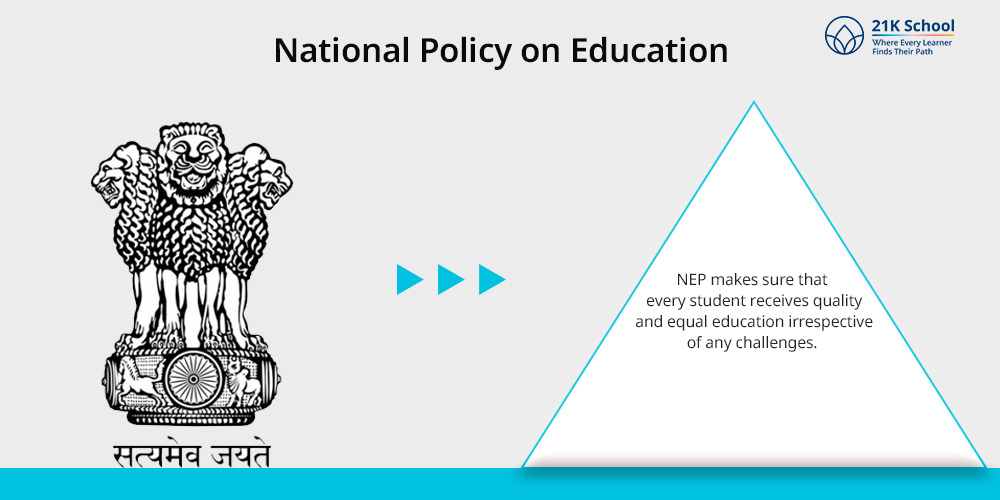
The National Policy on Education or NEP, sets rules and guidelines to emphasise the necessity of inclusive education. NEP makes sure that every student receives quality and equal education irrespective of any challenges.
RCI makes sure that every school and higher education institute follows the policies of NEP and includes inclusive classes. This promotes a positive learning environment among students and provides a collaborative learning experience.
Conclusion
The Rehabilitation Council of India (RCI) is a key player in promoting inclusive education by establishing standards for training and ensuring the quality of education for students with disabilities.
Through its many initiatives, such as training program standardisation, Central Rehabilitation Register maintenance, and collaborations with educational institutions, RCI fosters equality and diversity in education.
RCI ensures that all students, regardless of their barriers, have access to high-quality education by upholding legal frameworks like the Rights of Persons with Disabilities Act and the National Policy on Education.
The RCIs’ commitment to inclusive education empowers individuals with disabilities and improves India’s educational system as a whole.
